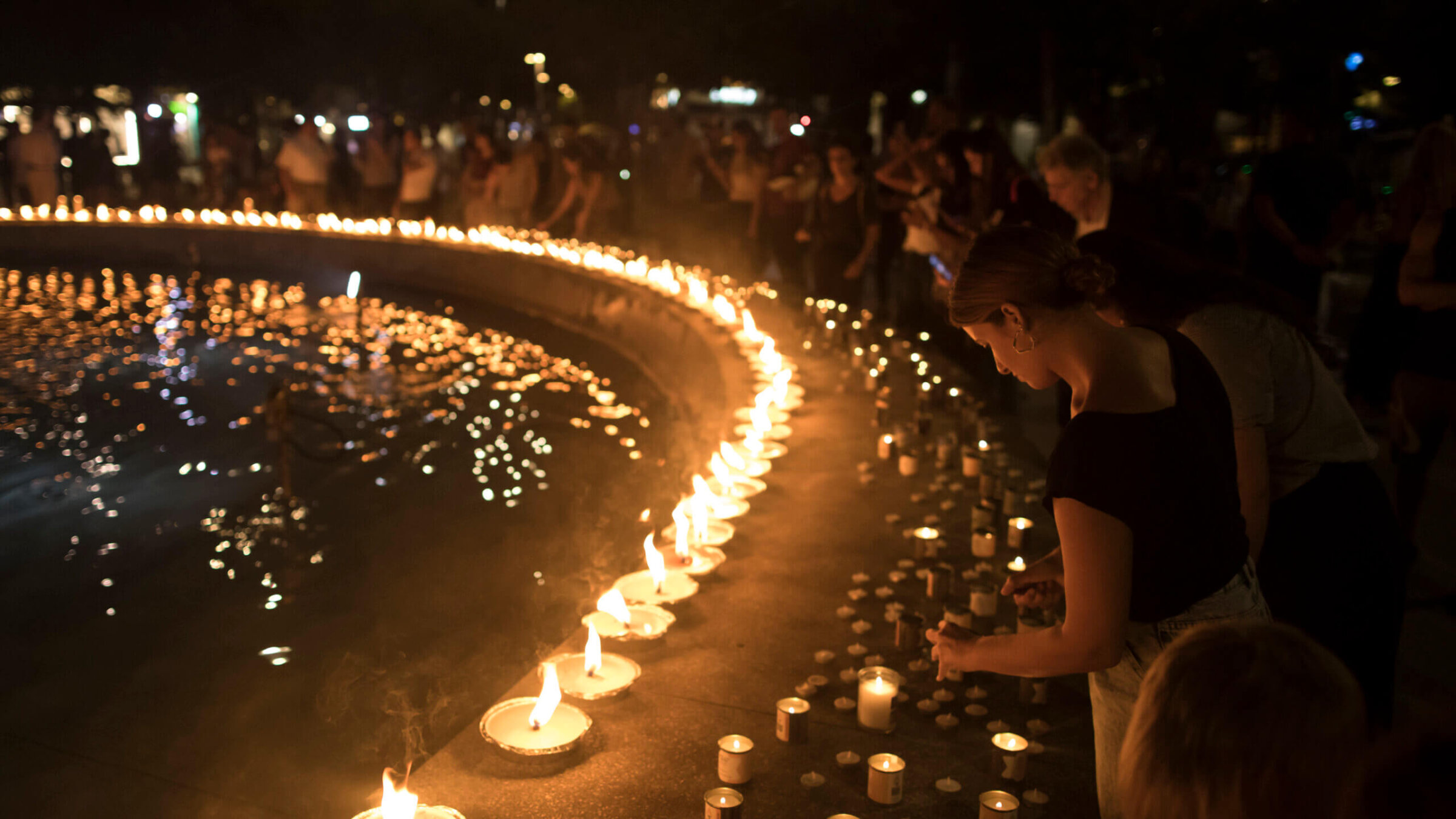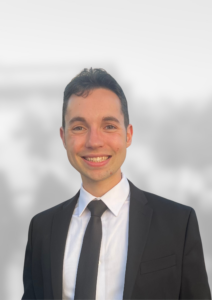I made aliyah right before Oct. 7. Here’s why I stayed.
To be truly Israeli means to live with danger every day — taking on that burden is a privilege

People light candles in memory of the civilians and soldiers killed during the Oct. 7, 2023, Hamas attack on Israel. Photo by Amir Levy/Getty Images
Whenever Israelis detect the New York accent beneath my Hebrew, they abruptly halt our conversation to ask me how long I have lived in Israel.
My answer: since August 2023.
“Wow,” they respond every time. “You picked quite a time to come.”
When I moved to Israel, I couldn’t have foreseen the horror that would unfold less than two months later, when Hamas terrorists stormed the southern border, massacred almost 1,200 citizens, and took 251 others hostage on Oct. 7. In all the years I spent dreaming of my aliyah — the return to the homeland described with mystical grandeur in Jewish texts — I never accounted for the country being thrust into national disarray.
I thought Israel’s existential vulnerabilities were a relic of its past. As Rabbi Abraham Isaac Kook, the grandfather of religious Zionism, wrote at the beginning of the 20th century, “the entire nation believes that there will be no further exile after the current redemption unfurling before us.”
And yet, Shimon ben Yochai says in the Talmud that God required the Jewish people to suffer to receive the land of Israel. One year since Oct. 7 — a year I spent learning to adjust not just to life in a new country, but life in a new country torn by grief and strained by the longest war in its history — his ancient words feel contemporary. Suffering alongside the Israeli people this year with a raw, national anguish has shown me what making aliyah truly means. And it’s made me sure that I will never leave.
In my first weeks here, before Oct. 7, I tried desperately to integrate into Israeli society. I rehearsed my lunch orders in Hebrew, familiarized myself with neighborhood geography, and attended shiurim — lectures on Torah — delivered by Israeli rabbis. But the more I tried to belong, the more estranged I felt. I was born and bred in New York, raised in an American Jewish society that is palpably different from Israeli culture. Early in that integration process, I sensed that no matter how well I learned to roll my Rs, something about “becoming Israeli” would remain elusive.
I only understood what it was after Oct. 7.
In the United States, I never had to sit and listen as a friend numbered off all his fellow soldiers killed in Gaza. I never had to hurry to shelter from Iranian rockets, wondering if Jerusalem would fall under fire. I never knew what it was like to attend rallies demanding my government prioritize rescuing citizens held hostage — or to cry with frustration and grief at the delays imperiling their precious lives.
These are distinctly Israeli experiences. They show me the part of being Israeli I never understood before. Every day here involves learning to live with a danger that I never previously needed to contend with.
In June, a new friend of mine was injured by mortar fire while on reserve duty in Gaza. When I visited him in the hospital, he was sitting in a wheelchair, with his leg wrapped in bandages. I approached delicately and spoke in a hushed voice, trying to mask the guilt I felt over never having enlisted in the Israel Defense Forces myself.
My friend’s parents arrived shortly after me, to wish him goodnight. I imagined myself in their position. I may not have served in the Israeli army, I thought, but my children will. I wasn’t sure if that made me feel better or worse.
Risking death for my country was never asked of me in the U.S. In some ways, doing so feels unthinkable. And yet, Israelis like my friend are not only asked to do so, but are instinctively willing to sacrifice their lives for one another.
“There is among Israelis today,” the Israeli journalist and author Amos Elon wrote in his 1971 book, The Israelis: Founders and Sons, “an elemental, almost tribal sense of sticking together which sometimes confounds outsiders from the fragmented societies of the West.”
The national fraternity Elon describes explains what bound Israel then, and still defines Israel now. And now I, too, have experienced it firsthand.
One Saturday night in Jerusalem a few weeks ago, I went for a jog along King George Street and passed by Paris Square, where rallies demanding the release of the 101 hostages who remain in Gaza — dozens of whom are believed to be dead — are held every week. As usual, I paused my run to join the crowd, a reminder to myself that as I run free, Israelis sit captive.
The program at first proceeded as usual: A speaker decried the abandonment of the hostages, and the crowd shouted back in outrage. But then something different happened: On the stage facing the crowd, a video montage of those 101 hostages began to play.
I did not recognize most of the faces, but the humanity in the videos struck me. There they were, before their captivity: dancing, laughing, eating, being silly. It was hard to imagine these same lively, vibrant people chained in tunnels underground.
I wept. I wasn’t alone. These hostages felt like members of our own families. We were crying over them together.
Where does this sense of familial love come from — the sense that all Israelis belong to one another?
This year has taught me how much that feeling has to do with the heavy weight of a shared fate. My commitment to Israel — to its future, its identity, its people — has been transformed since Oct. 7. I feel ownership in this country, responsibility toward my fellow citizens, in ways I never did when I lived in the U.S. And with that sense of responsibility, I have found, comes a sense of a deeper relationship with every Israeli around me — no matter who they are.
To suffer with a people is to love them in their worst moments. A bond forged in pain is one that lasts a lifetime. Many Israelis have expressed surprise at my decision to stay here after Oct. 7. But it was Oct. 7 that cemented my need to be a part of this country. Its failures, its triumphs and its future are my own.
“If I were in America on Oct. 7,” I tell them, “I would have moved here right away.” Israel demands that citizens enter a partnership marked by pain and hope; because of the trauma we’ve experienced, I see that partnership as an honor that brings more meaning to my life.
After Israelis hear this, their befuddlement melts into recognition. “Of course,” they say, “there is nowhere to be but Israel.” Finally, we reach understanding.





















